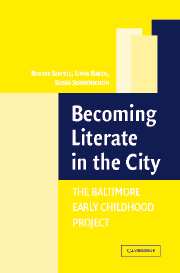Book contents
- Frontmatter
- Contents
- Preface
- 1 Early Appropriation of Literacy in Sociocultural Context
- 2 Growing Up in Baltimore : The Early Childhood Project
- 3 The Intimate Culture of Children's Homes
- 4 Processes of Literacy Enculturation in the Home
- 5 The Development of Literacy Competencies and Orientations
- 6 The Agenda and Practices of Schooling
- 7 Relations Between Homes and Schools
- 8 Conclusions and Implications for Policy and Practice
- References
- Name Index
- Subject Index
5 - The Development of Literacy Competencies and Orientations
Published online by Cambridge University Press: 17 December 2010
- Frontmatter
- Contents
- Preface
- 1 Early Appropriation of Literacy in Sociocultural Context
- 2 Growing Up in Baltimore : The Early Childhood Project
- 3 The Intimate Culture of Children's Homes
- 4 Processes of Literacy Enculturation in the Home
- 5 The Development of Literacy Competencies and Orientations
- 6 The Agenda and Practices of Schooling
- 7 Relations Between Homes and Schools
- 8 Conclusions and Implications for Policy and Practice
- References
- Name Index
- Subject Index
Summary
In this chapter, we focus on literacy-related competencies and their growth. A vast amount of research has been conducted on cognitive competencies of early reading. Because it is beyond the scope of our book to provide an extensive review of this literature, we refer the reader to such sources as Kamil, Mosenthal, Pearson, and Barr (2000); National Reading Panel (2000); Neuman and Dickinson (2001); Pressley (2002); and Snow, Burns, & Griffin (1998). We examine here the course of development in cognitive skills that are necessary but not sufficient for proficiency in reading, such as phonological awareness, knowledge of the alphabet, word attack skills, and word identification (Baker, 2000). We also examine the course of development of oral narrative production, knowledge about print, story comprehension, and reading motivation. We analyze these component competencies and orientations with respect to their relations to various dimensions of intimate family culture considered in Chapter 3. We also examine how early competencies relate to measures of literacy in grade 3, including standardized tests of word recognition, vocabulary knowledge, and passage comprehension.
In an ideal world, all the children in the Early Childhood Project would appropriate literacy in such a way that as adults they exhibit the characteristics of the expert readers studied by Pressley and Afflerbach (1995). These expert readers engaged in “constructively responsive reading” that includes (1) active processing that begins before, continues during, and persists after reading; (2) purposeful focus; (3) varying speed; (4) predictive, flexible interpretation; (5) inference and integration; (6) personalized interpretation (an important facet of appropriation); (7) review, note-taking, and reflection after reading; (8) metacognitive monitoring of their own comprehension; and (9) affective engagement with and response to the text.
- Type
- Chapter
- Information
- Becoming Literate in the CityThe Baltimore Early Childhood Project, pp. 134 - 181Publisher: Cambridge University PressPrint publication year: 1958



